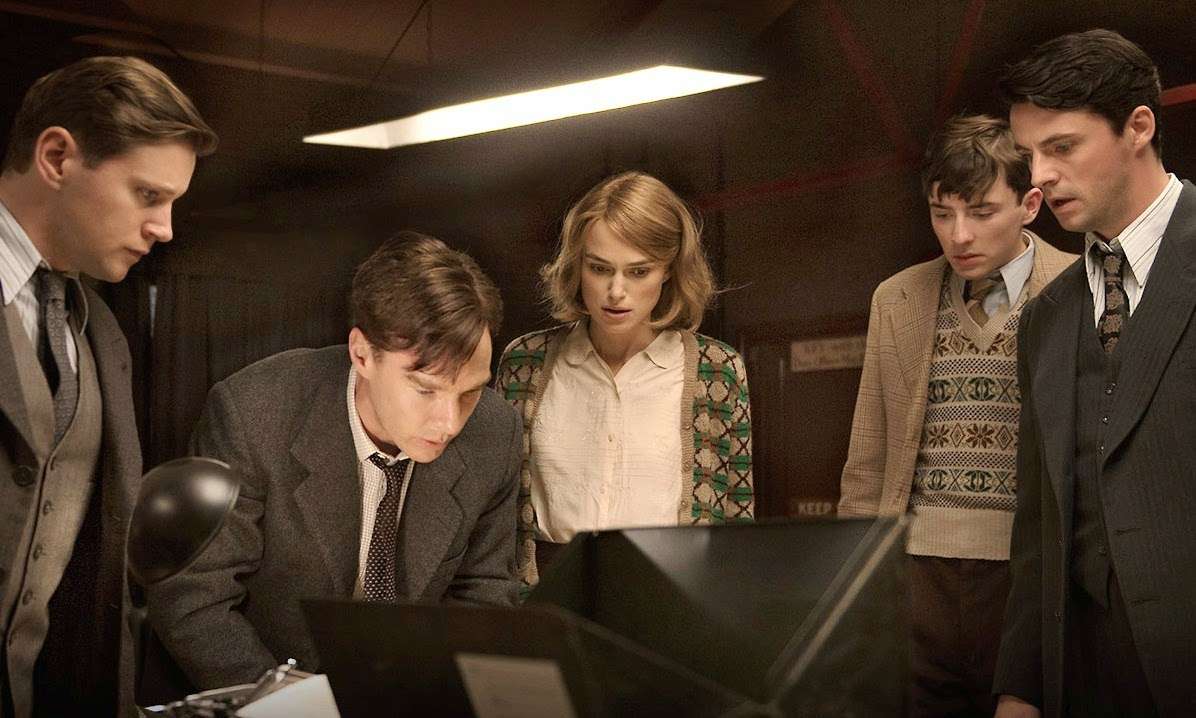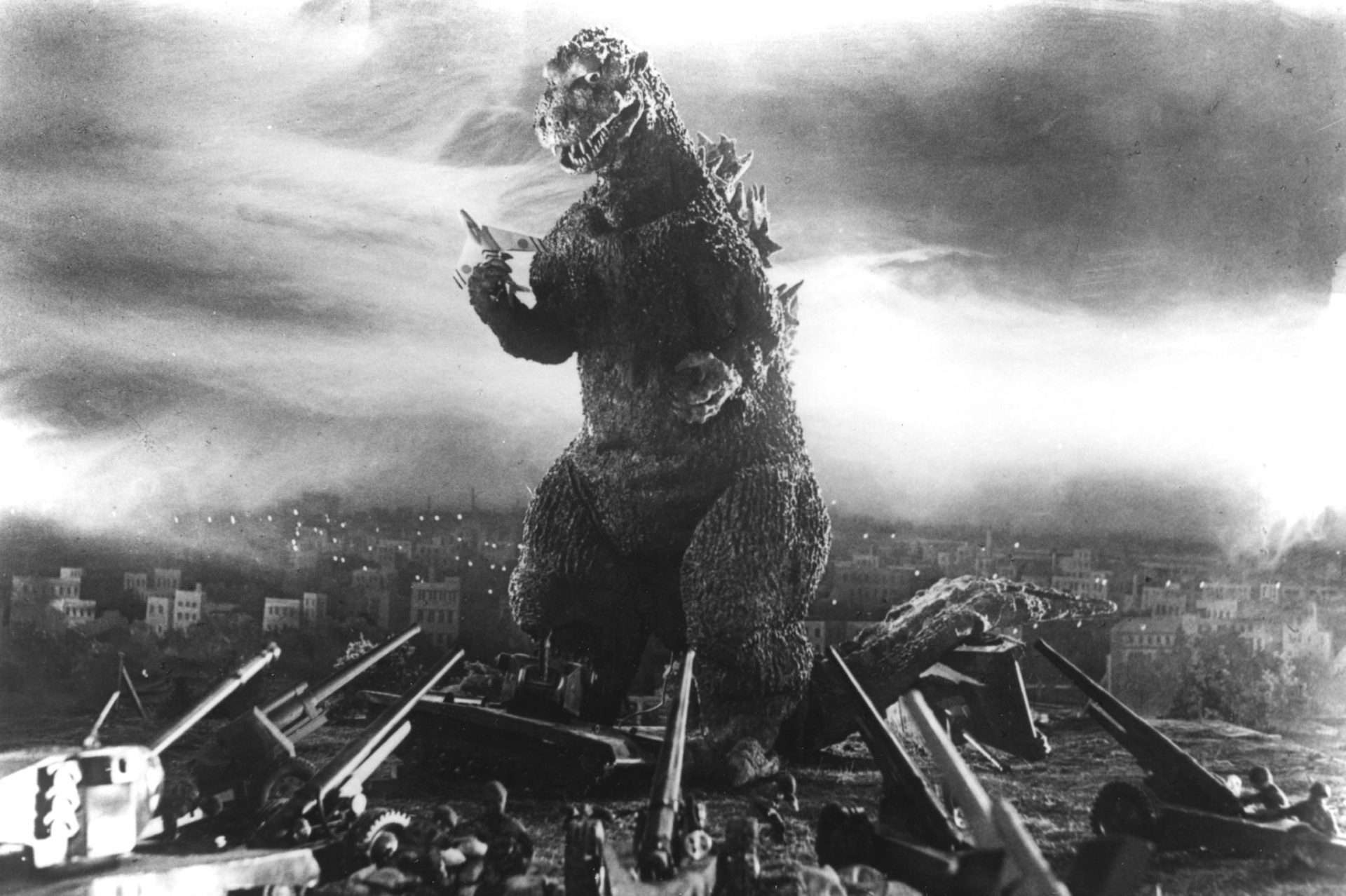10 Thematically Similar Movies to Watch If You Like ‘Oppenheimer’: Christopher Nolan’s much-awaited Oppenheimer has finally been released to the joy of his admirers. The film was anticipated not only because it was a Christopher Nolan film but also because it was the first biographical drama film that he was directing. The subject is a challenging one due to the complexity of the protagonist’s role in world history. People had been divided on the choice to explore a man with a politically nuanced perspective who caused the development of a genocidal weapon. A whole discourse continues to be devoted to the Japanese sentiment on the bombings and their deliberate exclusion from the film.
The noise around Oppenheimer’s (2023) intention, structure, and moral takeaways culminate in the conundrum of exploring people with questionable roles in the world order through cinema. The conundrum isn’t so much about whether to do it or not but about how to do it. Persecution of the people by the state is a common reality that has existed since the state came into the beginning. This demands us to delve deep into the lives of individuals to bring to light the violent attributes of our society and how these attributes manifest into action.
Following is a list of movies that are either similar in vein to that of Oppenheimer or present themselves as important complements to the film.
10. Rocketry – The Nambi Effect (2022)
The story of Dr. S. Nambi Narayanan is remarkably similar to that of Dr. J. Robert Oppenheimer on the surface: a brilliant scientific mind who worked tirelessly to prove his patriotism and contributed to his country’s scientific development only for the nation-state to politically assassinate him later. While Dr. Narayanan didn’t cause the exclusive invention of a new technology, unlike Oppenheimer, he led a team of engineers that acquired the liquid propulsion engine technology from the French. The Indian space research program took a roaring turn after the development of Vikas Biopropulsion Engine Technology, as the rocket engines previously used solid propellants.
However, Dr. Narayanan was later accused of exchanging sensitive information about rocket engine technology for money with two Maldivian women allegedly linked with spy networks. The accusation implied that Dr. Narayanan traded state secrets with its political enemies. After a long and tedious legal and social battle, Dr. Narayanan was acquitted of all charges and compensated by the state. On the other hand, Oppenheimer was accused of being a security risk for having communist associations and was strategically removed from policymaking by his political enemies. His reputation was partially rehabilitated by the government years later.
But apart from the similarity in terms of the political assassination of a scientific mind, there is no similarity in both films. While Oppenheimer is directly adapted from a non-fiction book American Prometheus: The Triumph and Tragedy of J. Robert Oppenheimer, based on the robust research work of Kai Bird and Martin J. Sherwin, Rocketry is solely derived from the word of its subject and protagonist, Dr. Narayanan. The latter is a hagiographic account in awe of its subject and lacks a nuanced character sketch of the man it covers. Instead, it presents a unidimensional account in a bid to manipulate its audience into feeling sympathy for its subject. Oppenheimer, on the other hand, not only shows its subject’s passivity and conformity in the events that transpired at a tremendous social and human cost but also harshly criticizes the political environment in which the subject exists.
9. A Beautiful Mind (2001)
A Beautiful Mind by Ron Howard is a biographical drama based on Sylvia Nasar’s 1998 biography of mathematician John Nash. But being an adaptation of a biographical book isn’t the only similarity A Beautiful Mind shares with Oppenheimer. The connection is much deeper than we would popularly know. In 1957, John Nash held a fellowship at the Institute of Advanced Studies, Princeton University, where Oppenheimer was director. Nash questioned the assumptions of veteran quantum physicists on some contradictions of quantum mechanisms as he deemed them to be. While initially dismissed by Oppenheimer, his persistence ensured a discourse with the director. Nash later apologized but also commented on the dogmatic attitude of physicists. Unfortunately, Nash had to leave that summer and suffered from mental illness later on.
Oppenheimer was always sympathetic to Nash’s struggle, and therefore, when Nash recovered, Oppenheimer invited him back to the institute. A Beautiful Mind is not a perfect film by any means. It has also been criticized for its unrealistic portrayal of mental illness. But it doesn’t fall short of celebrating the man with nothing but empathy for him. It recognizes the man’s brilliance and the ordeals that shaped much of his life. Oppenheimer doesn’t remotely suffer from the same problems as Nash, for his troubles were extrinsically instigated, only inflated by his political ignorance to the point of idiocy. To recognize crucial differences, A Beautiful Mind’s screenplay differs significantly from its subject’s life, whereas Oppenheimer’s screenplay is a direct and quite accurate adaptation.
8. Ek Doctor Ki Maut (1990)
Subhash Mukherjee was an Indian scientist and physician from Hazaribagh, British India, who created India’s first child via in-vitro fertilization in 1978. The first in-vitro fertilization baby preceded this in the world in the UK. His claim to have created the first Indian test-tube baby was ignored and later put to suspicion by the state. As a result, a committee was formed by the government of West Bengal to investigate the claim consisting of prominent doctors, radiophysicists, neurologists, and physiologists, which insulted Subhash Mukherjee. To add to the humiliation, the government of India denied him permission to attend international conferences and share his scientific achievement with the international community.
Feeling dejected by his colleagues and the state, Dr. Subhash Mukherjee killed himself in 1981. State-endorsed social ostracisation killed a brilliant mind, contributing to India’s ill-repute as being apathetic to scientific temperament and nurturing professional envy. Tapan Sinha’s Ek Doctor Ki Maut (1990) is a film inspired by Dr. Subhash Mukherjee’s life. Pankaj Kapoor plays Dr. Dipankar Roy, who develops a vaccine for leprosy but suffers the same fate as Dr. Mukherjee as his colleagues humiliate him and the state ignores him.
However, unlike his real-life counterpart, Dr. Roy is not shown to have taken his life. Sharing the common narrative element of the protagonist being harassed by the state and colleagues, Oppenheimer is a fine reminder for Ek Doctor Ki Maut. However, we must recognize considerable differences when discussing both films. While Oppenheimer is based on a true story, a real-life person merely inspires Ek Doctor Ki Maut, and the protagonists’ motivations have no similarities.
7. Philadelphia (1993)
A list of films similar to Oppenheimer (2023) remains incomplete without talking about the story of Andrew Beckett, played by Tom Hanks in Philadelphia (1993). Andrew Beckett is an attorney working for a law firm who is abruptly fired by his employers when they discover his homosexual identity and his positive diagnosis of AIDS. While struggling with his illness, Beckett chooses to fight his employers and sues them. We can definitely see the parallels with the story of Oppenheimer as Oppenheimer’s security clearance gets unfairly revoked, irrespective of his professional competency.
While Oppenheimer doesn’t face a direct trial for his “alleged” political identity, his security hearings mimic the mechanisms of a trial, for they are targeted to humiliate him and destroy his integrity. However, Beckett fights the unfair treatment meted out to him in quite an upfront manner, unlike Oppenheimer, who chooses passivity and conformity in the event of his political assassination. That being said, both films manage to reflect upon a violent aspect of our reality that one’s competency gets shadowed by prejudice against one’s identity in matters of critical decision-making, causing the perpetuation of discrimination in various forms.
6. Barefoot Gen 1 (1983)
One of the common talking points regarding Oppenheimer among cinephiles has been its deliberate exclusion of the plight of Japanese people who became victims of the nuclear genocide. Many have criticized Nolan for showing an ignorant attitude towards those who suffered in favor of the one who suffered in the guilt of the suffering of the former. On the other hand, I do not hold the director at fault here because I believe his primary motive was to compel the audience to feel Oppenheimer’s dread, having realized the destructive power of nuclear weapons coupled with an aggressive military strategy. And to create such an environment, he refuses to exploit the tragedy of the victims and rely solely on their misery.
In one of the many vital scenes in Oppenheimer, when the scientific community is going through the report on Hiroshima and Nagasaki bombings, implicitly consisting of photographs surveying the ground zero in the aftermath of the bombings, Oppenheimer is showing turning his eyes away due to what can be inferred to be a rush of guilt, and the fear of confronting one’s sins. In this sequence, a veil of ignorance is established for the audience under which we are supposed to take the original position and decide or advocate for a nuclear weapons policy.
The original position, theorized by John Rawls, renders us uninformed about our own place in society before deciding upon the structure and mechanisms of society. Therefore, we are supposed to be cognizant of mutual dependence, i.e., any nuclear policy advocated against another state is guaranteed to affect us similarly. There is no escape from the consequences of possessing, developing, and/or using nuclear weapons.
To cease the digression and pull ourselves back to the argument that Barefoot Gen (1983) is one of the films to essentially watch if one likes Oppenheimer (2023), I must establish that Mori Masaki’s adaptation of a manga by the same name written by Keiji Nakazawa is a horrifying portrait of the nuclear bombing on Hiroshima right from the time of the bombing to its aftermath. Its coverage of the bombing itself differentiates it from many films on the same theme/event, such as Shohei Imamura’s Black Rain (1989).
The faculty of animation allows Barefoot Gen to show the bombing in its crudest and ugliest form, creating one of the most terrifying sequences in cinema history. In many ways, Barefoot Gen is a complement to Oppenheimer. In one of the sequences in Oppenheimer, the military strategists, politicians, and scientists discuss and determine the location of the use of the first bomb: a military-industrial township that has workers’ houses and other infrastructure. Barefoot Gen portrays Hiroshima with humans that the bombers very casually discuss and decide to doom.
It is a film that must be watched to share Oppenheimer’s dread and understand what Isidor Rabi meant when he said he wouldn’t want the culmination of three centuries of physics to be a weapon of mass destruction. It is easy to get swayed by the jingoistic calls that advocate the destruction of “enemy” states; it is very easy to be proud of your country’s nuclear arsenal. But all that ease is only derived out of ignorance. Barefoot Gen washes away the ignorance and gives a glimpse into the history that also mimics our possible future if nuclear weapons are to be used, ever.
Movies Similar to Oppenheimer: 10 Films to Watch If You Liked Oppenheimer
5. The Imitation Game (2014)
To me, the Imitation Game is the most relevant entry in our series of “troubled geniuses persecuted by the state.” Morten Tyldum’s film tells the story of Alan Turing, a British mathematician and computer scientist, played by Benedict Cumberbatch, who developed the Turing Machine during the second world war that allowed the breaking of the German Enigma code. The machine catalyzed the deciphering of codes, enabling the British government to safeguard itself from German attacks. In a note, we are revealed that Turing’s effort shortened the war by two years and saved more than a million lives as a result. Turing is known as the father of theoretical computer science and artificial intelligence, as his invention led to the development of the modern computer.
The film shows that Turing is arrested in the post-war years on suspicion of being a Soviet Spy and is later convicted of gross indecency due to his homosexual identity. He is forced to go through chemical castration in lieu of a prison sentence. After enduring the torture of hormonal therapy for a year forced on him by the government, Turing killed himself. While the film deviates from many facts about Turing’s life and is loaded with historical inaccuracies, it gets one thing right: Turing’s murder by the state for his identity and not just in a sociopolitical sense.
While Oppenheimer built a weapon of mass destruction that led to the killing of countless, Turing’s invention saved lives by preventing bombings. The nuclear bombings ended the second world war in the propaganda spread by the US, whereas the Turing Machine contributed to the war’s shortening. Nevertheless, both inventions changed the course of the world. The bomb essentially led to the development of a method by which energy could be harnessed from nuclear fission, whereas the Turing Machine caused the development of the modern computer. Both scientists were persecuted systematically by the state in an unfair manner. The persecution cost Turing his life and Oppenheimer his integrity.
4. Gojira (1954)
Ishiro Honda’s classic film Gojira (1954) is one of the most influential films of all time. Its contribution to cinema is unparalleled, for it established the Kaiju universe and made the monster/disaster film genre more political than ever. Gojira finds a rightful mention in this list, mainly because the monster is a metaphor that manifests Oppenheimer’s worst fears driving his actions in Nolan’s directorial.
Gojira, the giant creature, is shown to be a direct outcome of a post-nuclear world and is indestructible even by humankind’s most potent weapon. In a post-war world, Gojira represents the arms race that ensued between the superpowers that are likely to consume the entire world. It is an unstoppable destructive force that will kill everything. The only thing that can stop it is a greater weapon, which indicates the perpetuation of the development of destructive powers and, consequently, humankind’s destructive tendencies leading it to its doom.
While Oppenheimer advocates a policy of candor to prevent the arms race and international control on nuclear energy to prohibit the development of atomic weapons, the existence of Gojira is shown to compel the development of a greater weapon. However, it is not detached from its sociopolitical reality. Therefore, the developer of the weapon, which eventually kills Gojira, commits to a deadly mission so that the weapon’s secret dies with him.
The same narrative element is used as a trope by Nolan in Tenet (2020), in which it is said that the scientist who invented the algorithm killed herself to prevent the passage of the algorithm to destructive powers. Oppenheimer’s conformist tendencies prohibit him from rebelling against the state, but his dread for the future is captured intriguingly in Gojira, as cinema must.
3. The Social Network (2010)
This genius is not troubled by the state. The genius of The Social Network (2010) continues to be one of the most immune personalities across the globe. David Fincher’s biographical drama film tells an aspect of Mark Zukerberg’s life during which he was accused and sued by his ex-business partner and close friend Eduardo Saverin for unfairly diluting his shares. The Winklevoss brothers and Divya Narendra also sue Zuckerberg for intellectual property theft. The one similarity The Social Network shares with Oppenheimer is that both Zuckerberg and Oppenheimer became the most popular software developers and physicists, respectively, without “allegedly” having contributed much to the actual development of technology or physics.
Oppenheimer is described as the greatest salesman of science in the book, and in a similar fashion, Zuckerberg can be described as the most excellent salesperson of social media technology. The individual brilliance of both people has been scrutinized repeatedly. Additionally, the primary narrative of both films is an ongoing trial (security hearings with the mechanisms and motives of a trial in Oppenheimer’s case) punctuated by sequences reflecting the protagonists’ lives. Both trials assassinate the reputation of their subjects, albeit with different methods and intentions, evoking different feelings in the audience.
2. At Eternity’s Gate (2018)
Julian Schnabel’s At Eternity’s Gate (2018) is a masterpiece in its own right and a much greater film than Oppenheimer (2023). But at their very center, both films have two geniuses, one not understood by their times and the other wholly misunderstood. Both films are about society failing these men and destroying their self-worth. Van Gogh’s artistic brilliance is incomprehensible to his contemporaries, whereas Oppenheimer’s brilliant premonition is taken as enmity against the state.
At Eternity’s Gate revolves around the controversial theory that Van Gogh was killed, as against him killing himself, which is widely believed. Oppenheimer never reaches a point to hint if the security hearings caused the deterioration of his health, contributing to his early death. Still, it presents sufficient evidence to show how his political enemies killed his sense of self. And in both films, we find a handful of people who love the protagonists and stand by them.
1. The Wind Rises (2013)
Arguably the finest entry in the list and most certainly my personal favorite, Hayao Miyazaki’s epic The Wind Rises captures an artist’s dilemma. It plays around the troubled line between passion and obsession. When one’s passionate, they remain self-aware of how the passion manifests. When self-awareness is compromised, passion begins to mimic obsession, and the consequences of its manifestation go beyond the line of sight of an artist. Jiro Horikoshi is passionate about aircraft and goes on to become a designer-engineer. The film captures his endeavors before and during wartime in Japan and his personal struggles in life. In a comprehensive account, the manifestation of his passion is branded a cursed dream, filling him with the regret that his creation was used for war, akin to the supposed guilt of Oppenheimer.
But while Oppenheimer possessed the necessary power in the Washington Circle, Jiro never had any form of power but only acted like a cog in the machine. Oppenheimer chose not to act against the use of the bomb to remain connected with the who’s-who of Washington and sustain their approval of him in his political naivete. On the other hand, Jiro is aware of the political consequences of his actions in an environment he is suffering.
Most importantly, both films cause us to reflect upon the cost of inventions and the role particular inventions played in shaping the history of the world. Consequently, a further and most crucial question arises: once an artist fully realizes an art, and hence, detached from them, do they obtain an utterly exclusive identity of their own, with the consequences being not the artist’s fault but the faults of those who consume the art, and those who put it up for consumption?
Oppenheimer, the person, gives a definitive answer in the film when he objects to the petition to stop the use of bombs by saying because we have developed the bomb doesn’t mean we get to decide what to do with it. And once it was used, Oppenheimer turned against his words to advocate for the prohibition of the use of nuclear weapons. The question remains open-ended, subject to continuous deliberations, and an originator of conflicts. But such is the power of cinema.


















